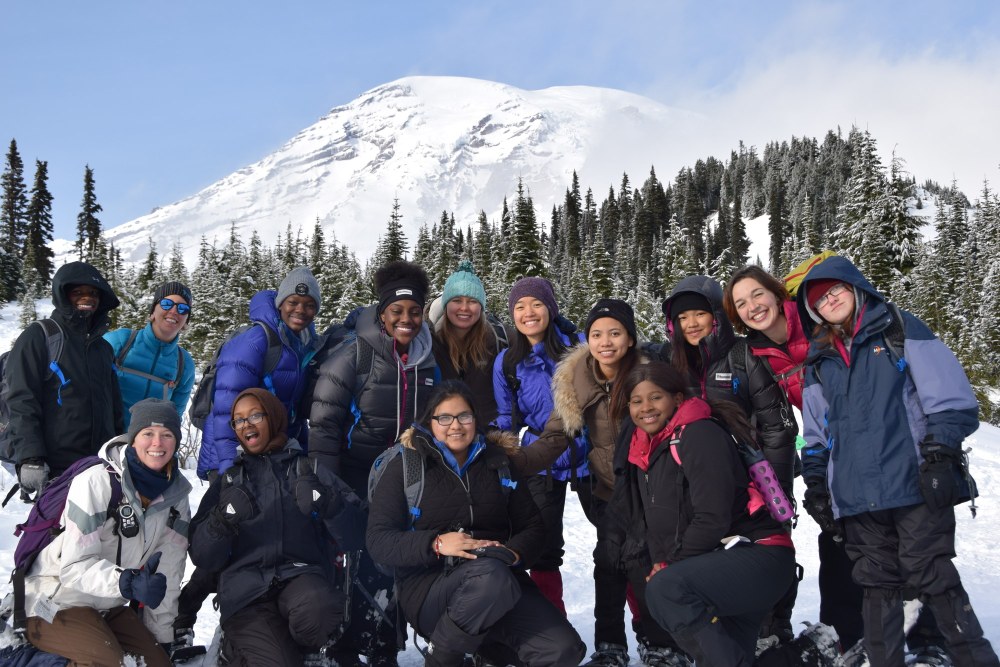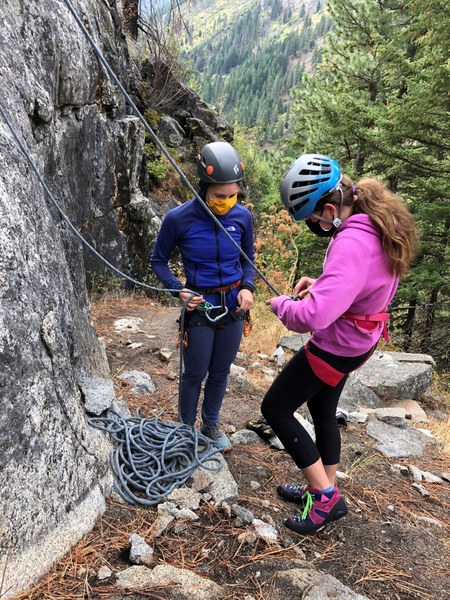
Teaching kayak self-rescue on a bleary Northwest day. Practicing crevasse rescue with a “fallen climber” twice your size. Encountering surprise sleet and snow on a backpacking trip. Of the many challenging situations they encounter, navigating federal permitting processes is one of the few that make our volunteer leaders groan.
Designed to facilitate safe and responsible access to the outdoors, these processes unfortunately have become a barrier to the outdoors themselves. Outdated, inconsistent, and challenging to navigate, our local and federal permitting systems are long overdue for an upgrade.
A tangled web
Inconsistencies are one of the major concerns we face when attempting to secure permits. The rules are different for each land manager, and they can even vary between districts in the same National Forest. Permitting requirements can change from one year to the next as well, making it challenging to keep up with the many moving parts.
In Washington we’re fortunate to have wonderful folks managing our public lands, who work hard to partner with providers like us. While this spirit of partnership goes a long way towards meeting everyone’s needs, the complex permitting system remains slow and adds to the workloads of our land managers, our staff, and our volunteers.
These challenges aren’t just a bureaucratic headache. When outdoor education organizations like The Mountaineers aren’t able to get the permits we need to conduct our programs, our scope becomes far more limited. We miss out on opportunities to train the next generation of outdoor leaders and stewards, or to introduce kids to the wonders of nature.
Coalition for Outdoor Access
Through conversations with other organizations and businesses, we realized that we weren’t the only ones struggling to figure out this complex process. In fact, issues with the outfitter guide permitting system were preventing groups like YMCA BOLD & GOLD from taking groups of youth from underrepresented communities to National Forests near Seattle. “We take young people to Canada for many of our rock climbing programs because we can’t get a permit locally,” said BOLD & GOLD admissions director Robin Chiles. A variety of factors, from permit moratoriums to lack of staffing capacity, limit access to the outdoors for those who need it the most.
In 2014 The Mountaineers collaborated with a wide range of local and national outdoor groups to identify solutions and speak with a unified voice. This effort, formalized as the Coalition for Outdoor Access, unites nonprofit outdoor education organizations, outfitters, guides, and the greater outdoor industry to advocate for improvements to the permitting process. By working collaboratively, we’ve made significant strides in how federal land management agencies are approaching facilitated access for outdoor recreation. However, due to the extent of the dysfunction in our permitting systems, federal legislation is necessary.
Simplifying Access to Outdoor Recreation (SOAR) Act
After years of work behind the scenes, The Mountaineers and our partners worked with members of the U.S. Congress to introduce the Simplifying Outdoor Access for Recreation (SOAR) Act. The SOAR Act will help fix the current recreational permitting system that creates barriers for people hoping to experience the outdoors. We helped shape this bill because it impacts an integral part of who we are as Mountaineers: our volunteer-led trips, courses, and youth programs.
The SOAR Act will simplify the permitting process for both land managers and permit holders like The Mountaineers, freeing up staff and volunteer time. It will provide more flexibility by allowing us to engage in activities that are similar to those specified in our permits: for example, if we already have a permit for snowshoeing that same permit could be used for backcountry skiing. The bill will also create a process to allow for multi-jurisdictional trips under the same permit. For instance, a scrambling trip that starts in the Olympic National Forest and ends in Olympic National Park wouldn’t need two separate permits. Finally, it would ensure that we don’t lose permit days due to unforeseen circumstances like weather or wildfire, which increases the safety of Mountaineers trips.
While these improvements may seem technical, collectively they will help to improve access to the outdoors. This is fundamentally an issue of equity, as many people are first introduced to the outdoors through some sort of “facilitated access” like our Mountain Workshops. Not everyone is fortunate enough to have an aunt who rock climbs or a neighbor with extra camping equipment. Helping more people experience the value of public lands will create future conservationists as well. At The Mountaineers, our courses and trips connect people to public lands, and we’ve seen time and time again that this is the first step to becoming an outdoor advocate. People protect what they love.
We’re proud to be able to bring the voices of Mountaineers leaders to national lawmakers through our advocacy for the SOAR Act. Our on-the-ground perspective is valuable to members of Congress. “It is often said that all politics are local. To be successful advocating for policy change in Washington DC, it is essential to lift up the voices of the people and organizations from outside the beltway that are most impacted by policies developed at the federal level,” said Paul Sanford, National Director of Recreation Policy at The Wilderness Society. “The Mountaineers have been a key player in this campaign.”
 Mountaineers Adventure Club students rope up for a climb at Leavenworth. Photo by Carl Marrs.
Mountaineers Adventure Club students rope up for a climb at Leavenworth. Photo by Carl Marrs.
Next steps
The SOAR Act passed a key House committee last year, but it did not pass the full House and Senate before the end of the 116th Congress. We’ve made great progress in securing bipartisan support and working out the differences with stakeholders, and we remain optimistic that the SOAR Act could pass Congress and get signed into law. There’s still a long way to go, but “without The Mountaineers participation, we would not be on the cusp of passing legislation that will make a real difference,” said Sanford.
While writing legislation can be a grind and regulatory reform isn’t the sexiest subject, The Mountaineers and our fellow SOAR Act advocates continue to push for change because we know the transformative power of time outside. We want our members and volunteers spending their time hiking, skiing, climbing, and teaching – not grappling with permits. We want to get more kids outside, from all parts of our greater Washington community, to experience what the Northwest has to offer. There are so many barriers to getting outside, and these are often compounded by bureaucratic red tape. By removing those barriers, we can look forward to a more accessible outdoors.
This article originally appeared in our Spring 2021 issue of Mountaineer Magazine. To view the original article in magazine form and read more stories from our publication, visit our magazine archive.
 Betsy Robblee
Betsy Robblee